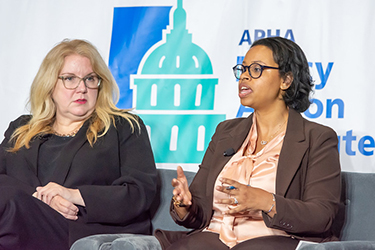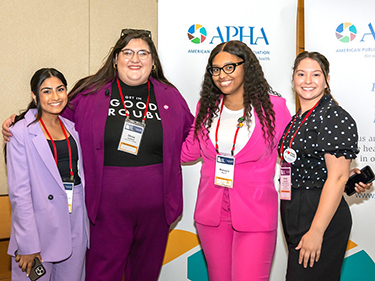Policy, community and advocacy are key drivers to improving health outcomes, and public health supporters can use those tools to build a healthier America.
Public health leaders brought home that message during APHA’s fifth annual Policy Action Institute in Washington, D.C., June 16. Innovation, partnerships, intersectional collaborations and policy can save lives and improve health, said the speakers, who shared lessons from the federal, state and local levels.
Chiquita Brooks-LaSure, MPP, administrator for the Centers for Medicare and Medicaid Services, told in-person and online institute participants that the agency learned during the COVID-19 pandemic that too much red tape harmed access to care.
CMS played an important role in protecting public health during the pandemic through waivers and increasing flexibilities to allow health agencies and clinics to serve more people. For example, CMS broadened access to Medicare telehealth services so that users could receive a wider range of care from home, and also waived barriers that prevent low-income people from accessing Medicaid.
The lessons have helped CMS apply waivers to current issues, such as the benefits of expanding postpartum Medicaid coverage from 60 days to one year after childbirth, something most states have adopted. The option for a full year of Medicaid coverage postpartum was eventually signed into U.S. law.
When the next U.S. pandemic arrives, CMS will be well-placed to expand health care access swiftly and accordingly, Brooks-LaSure said.
“We know the waivers we would need to put in place immediately,” she said.
The Centers for Disease Control and Prevention took a public relations hit during the pandemic, as the agency grappled with containing a novel virus with multiple variants.
Nirav Shah, MD, JD, who was named principal deputy director of CDC in March, said the federal agency is in the process of shedding bureaucracy that hindered quicker action. It has also increased its focus to improve rural health, expand mental and behavioral health, and better understand how systemic racism impacts health.
 A pivotal moment came for the latter when CDC Director Rochelle Walensky, who announced she is leaving the agency at the end of June, declared racism a public health threat in April 2021.
A pivotal moment came for the latter when CDC Director Rochelle Walensky, who announced she is leaving the agency at the end of June, declared racism a public health threat in April 2021.
“That set the tone for how CDC thinks about it,” Shah said.
CDC is also working to improve its communication. Shah said he recently met with a psychologist who specializes in communication strategies to learn in greater detail how people process information.
Across federal health agencies, leaders work closely together to increase health equity, something that might surprise the general public, said Carole Johnson, MPA, administrator of the Health Resources and Services Administration.
Most recently, HRSA has been working with CMS on more effective ways to reach people in underrepresented communities, Johnson said.
Local, community health workers play important roles
Important public health policy work is also being done at the state and community levels on a wide range of issues, public health leaders said during the institute.
Bobby Watts, MPH, MS, CEO of the National Health Care for the Homeless Council, said every state and city in America has a problem with homelessness, despite broad knowledge of effective programs to end it. The gap between knowledge and action must be addressed, he said.
America’s homeless situation “is a failure of almost every system in society,” Watts said.
“Health care and housing are human rights. It is a matter of social justice,” he said.
Sherée Thaxton Vodicka, MA, president and chief executive officer of the NCAlliance of YMCAs, said community organizations and companies not directly related to health care can do a lot to improve health equity. The YMCA in North Carolina, for example, has programs for physical activity, social connection and nutrition that are public health-based.
“Eighty percent of health care happens outside the health care industry,” she said.
Shavon Arline-Bradley, MPH, M.Div, president and CEO of the National Council of Negro Women, underscored that point by emphasizing the power of civic engagement to improve health and well-being.
“‘Power to the people’ was never a pun,” she said. “It was an action call.”
It is important to take action, but also to understand the power of messaging and storytelling to reach the public and policymakers. Public health professionals need those skills to complement their mission of protecting population health, she said.
“We are the original civic rights organizers,” Arline-Bradley said. “We are by oath to serve everyone.”
Photo top: Carole Johnson, left, administrator of the Health Resources and Services Administration, and Chiquita Brooks-LaSure, administrator for the Centers for Medicare and Medicaid Services, speak at the Policy Action Institute June 15, 2023. Bottom: Students and professionals came from across the nation to attend the event in Washington, D.C., while others watched online. (Photos by Gayatri Malhotra. See more in our Flickr album from the event.)